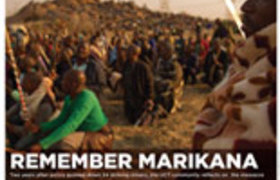Can good fences make good neighbours?
25 March 2015State police might be good at solving crimes, but they aren't always the best at preventing them, says Julie Berg, of UCT's Department of Public Law. To illustrate her point, all it took was some chickens, a fence, and a neighbourhood scuffle.
The story she relates, from John Cartwright and Clifford Shearing's Where's the Chicken? Making South Africa Safe, involves a man (call him T) complaining to his local 'peace committee' that he's been beaten up by a neighbour, but is reluctant to go to the police.
The peace committee invites the two to state their cases, and the accused (call him S) confesses to the assault, saying he was drunk and lost his temper. But S insists that it was brought on by T repeatedly insulting him and his children when they walked past T's house.
T, in turn, admits to this, and says it's because S's chickens keep coming over into T's yard and destroying his vegetable garden, leaving T's children with nothing to eat.
So what was the solution? "They built a fence," says Berg.
This resolution was unlikely to have come about had the police got involved, says Berg. Peace committees – some born out of necessity during the apartheid era, when police didn't come to the party for all communities – are a nonstate tool for promoting safety and preventing crime.
|
|
 This work is licensed under a Creative Commons Attribution-NoDerivatives 4.0 International License.
This work is licensed under a Creative Commons Attribution-NoDerivatives 4.0 International License.
Please view the republishing articles page for more information.
Feature
Faculty Focus - Law
Editorial
Photo Essay
Front page
Previous Editions










